Remote work. Flexible work. Working from home. Whatever you might call it, the widespread phenomenon is still something that many bosses and managers can’t stomach. Many of them want their workers back at the office for a wide range of reasons: whether it’s stubbornness, the desire for control, or having people attend meeting after meeting in person. The problem is that this inflexibility on their part is causing a lot of friction with their employees. After all, many white-collar workers have had three years’ experience working remotely and getting similar results as they would if they commuted to the office. A redditor who works in the IT field recently went viral on the r/antiwork subreddit for sharing how they had to travel to the office even during a snowstorm. They were told that they couldn’t work remotely at all, so they decided to follow that edict to the letter. Scroll down to check out their full story, as well as the discussion about WFH that they started online. Working from home is a divisive issue in many companies Image credits: Pavel Danilyuk (not the actual photo) One IT worker recently went viral after sharing how remote work wasn’t a possibility even during a massive snowstorm Image credits: Glenn Carstens-Peters (not the actual photo) Image credits: anon The OP shared how they decided to delete Microsoft Teams and their email from their phone so that they wouldn’t be available after hours anymore. They also ensured that nobody would ‘bother’ them with meetings outside of office hours. It was their way of fighting back against the rules regarding remote work. The irony is that because the redditor works in IT, they do everything remotely either way. Their post went viral on r/antiwork, getting over 30k upvotes, and inspiring other working redditors to share their own WFH stories, and how they fought back against draconian rules. As it turns out, it’s quite impractical to have an approach where everyone’s supposed to be in the office every single day. There’s a lot of wasted time and resources there. You’re not just burning time and fuel while commuting to the office. You’re also spending more on food (if you’re not bringing your lunch box to work), and sacrificing the time you could spend with your family to make your boss and boss’ boss happy. However, just like anything, working from home has its pros and cons. It’s not the all-encompassing force of good that some employees think it is. Neither is it as completely evil as some managers would love you to think. For example, some managers might feel that it’s far harder to train new employees remotely. And it’s generally true. New workers can have a harder time keeping up and learning new things. It’s also harder to form emotional connections with someone you haven’t met in person. Here’s how some readers reacted to the post about remote work Meanwhile, some managers think that their employees might be slacking off at home. However, research shows that the average employee is productive for fewer than 3 hours each day. Meaning that even if they’re at the office, most people are just really good at pretending to work, not actually working: there’s a lot of time spent doing anything else, from reading the news to checking social media. Some chronically overworked employees feel that they can do the job they’re meant to do quicker while at home. When they’ve done everything on their to-do list, they move on to other things, taking back control of their lives, and establishing a healthier work/life balance. That might mean cooking healthier food at home or spending more time exercising. Things that they might otherwise not have the time and energy to do after being caught up in a traffic jam on their way back from the office. However, WFH only works if the employee actually gets proper results. If they’re actually slacking off and avoiding work, there’s no excuse for that. And in that case, it might be worth considering whether they can function best when physically surrounded by other colleagues at an office. Or, in short: different employees tend to do their best work under different circumstances. Some have the self-discipline to do whatever they need to do, wherever they are. Others need fewer distractions and more managerial oversight. A hybrid approach to remote work can help balance out the downsides and focus on the upsides. For instance, the company might consider downsizing its office and saving on rental costs. Meanwhile, less time spent at the office means less time spent gossiping and being involved in interpersonal politics. Though, that comes at the expense of greater bonding with your coworkers. At the end of the day, what truly matters is good communication, transparency, keeping everyone on the same page, and setting realistic expectations. Without these things, it doesn’t matter if the company is fully-remote or forces its workers to be on-site at all times. Working from the office doesn’t automatically that everyone communicates well; working remotely doesn’t mean that everyone is detached and apathetic. It all depends on how the employees and their managers approach everything. Meanwhile, other internet users shared similar stories about managers who don’t want their employees to work remotely The post Person Maliciously Complies When They're Told They "Can't Work From Home" first appeared on Bored Panda. Person Maliciously Complies When They’re Told They “Can’t Work From Home”
Remote work. Flexible work. Working from home. Whatever you might call it, the widespread phenomenon is still something that many bosses and managers can’t stomach. Many of them want their workers back at the office for a wide range of reasons: whether it’s stubbornness, the desire for control, or having people attend meeting after meeting in person.
The problem is that this inflexibility on their part is causing a lot of friction with their employees. After all, many white-collar workers have had three years’ experience working remotely and getting similar results as they would if they commuted to the office.
A redditor who works in the IT field recently went viral on the r/antiwork subreddit for sharing how they had to travel to the office even during a snowstorm. They were told that they couldn’t work remotely at all, so they decided to follow that edict to the letter. Scroll down to check out their full story, as well as the discussion about WFH that they started online.
Working from home is a divisive issue in many companies

Image credits: Pavel Danilyuk (not the actual photo)
One IT worker recently went viral after sharing how remote work wasn’t a possibility even during a massive snowstorm



Image credits: Glenn Carstens-Peters (not the actual photo)

Image credits: anon
The OP shared how they decided to delete Microsoft Teams and their email from their phone so that they wouldn’t be available after hours anymore. They also ensured that nobody would ‘bother’ them with meetings outside of office hours.
It was their way of fighting back against the rules regarding remote work. The irony is that because the redditor works in IT, they do everything remotely either way.
Their post went viral on r/antiwork, getting over 30k upvotes, and inspiring other working redditors to share their own WFH stories, and how they fought back against draconian rules. As it turns out, it’s quite impractical to have an approach where everyone’s supposed to be in the office every single day. There’s a lot of wasted time and resources there. You’re not just burning time and fuel while commuting to the office. You’re also spending more on food (if you’re not bringing your lunch box to work), and sacrificing the time you could spend with your family to make your boss and boss’ boss happy.
However, just like anything, working from home has its pros and cons. It’s not the all-encompassing force of good that some employees think it is. Neither is it as completely evil as some managers would love you to think. For example, some managers might feel that it’s far harder to train new employees remotely. And it’s generally true. New workers can have a harder time keeping up and learning new things. It’s also harder to form emotional connections with someone you haven’t met in person.
Here’s how some readers reacted to the post about remote work


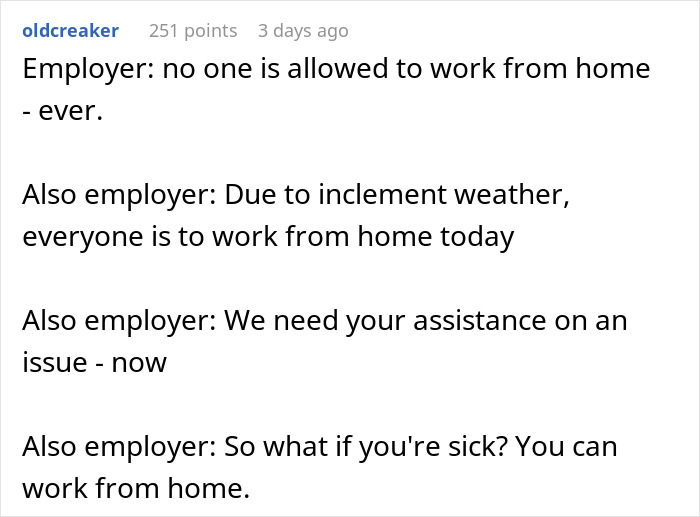


Meanwhile, some managers think that their employees might be slacking off at home. However, research shows that the average employee is productive for fewer than 3 hours each day. Meaning that even if they’re at the office, most people are just really good at pretending to work, not actually working: there’s a lot of time spent doing anything else, from reading the news to checking social media.
Some chronically overworked employees feel that they can do the job they’re meant to do quicker while at home. When they’ve done everything on their to-do list, they move on to other things, taking back control of their lives, and establishing a healthier work/life balance. That might mean cooking healthier food at home or spending more time exercising. Things that they might otherwise not have the time and energy to do after being caught up in a traffic jam on their way back from the office.
However, WFH only works if the employee actually gets proper results. If they’re actually slacking off and avoiding work, there’s no excuse for that. And in that case, it might be worth considering whether they can function best when physically surrounded by other colleagues at an office. Or, in short: different employees tend to do their best work under different circumstances. Some have the self-discipline to do whatever they need to do, wherever they are. Others need fewer distractions and more managerial oversight.
A hybrid approach to remote work can help balance out the downsides and focus on the upsides. For instance, the company might consider downsizing its office and saving on rental costs. Meanwhile, less time spent at the office means less time spent gossiping and being involved in interpersonal politics. Though, that comes at the expense of greater bonding with your coworkers.
At the end of the day, what truly matters is good communication, transparency, keeping everyone on the same page, and setting realistic expectations. Without these things, it doesn’t matter if the company is fully-remote or forces its workers to be on-site at all times. Working from the office doesn’t automatically that everyone communicates well; working remotely doesn’t mean that everyone is detached and apathetic. It all depends on how the employees and their managers approach everything.
Meanwhile, other internet users shared similar stories about managers who don’t want their employees to work remotely
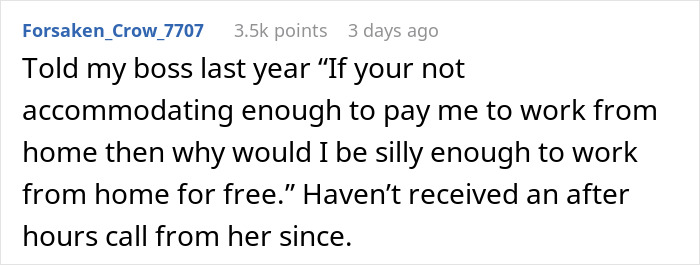





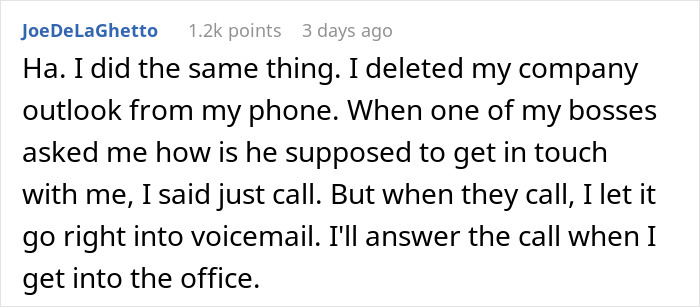
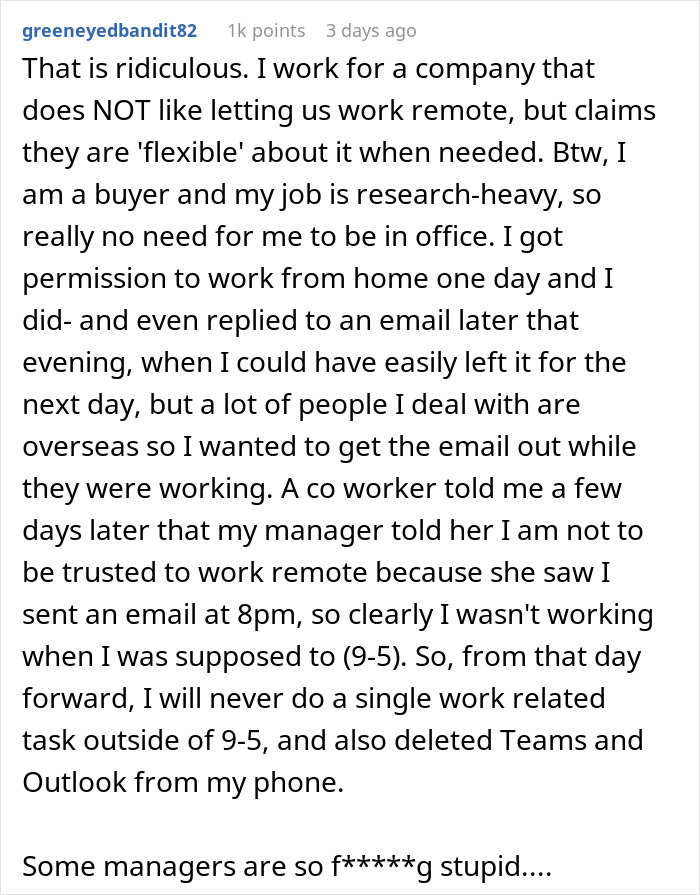



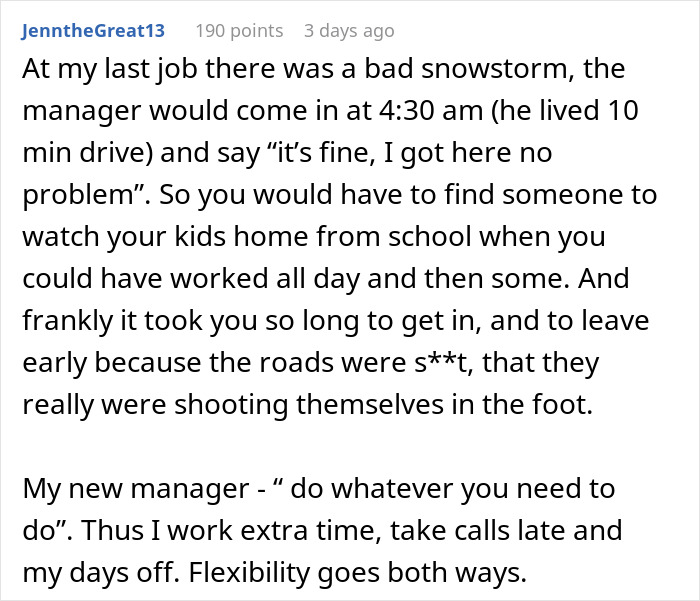
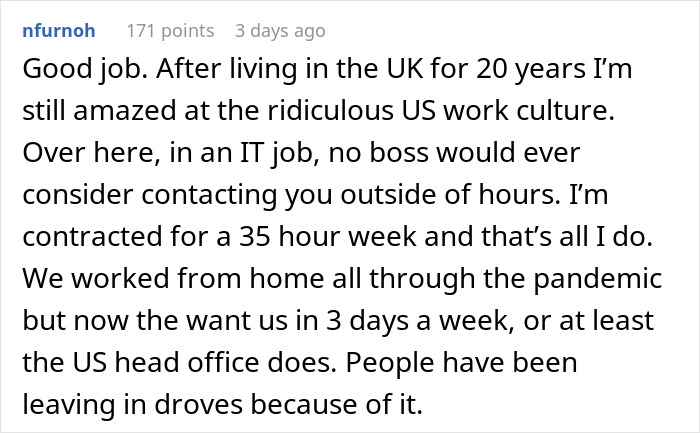
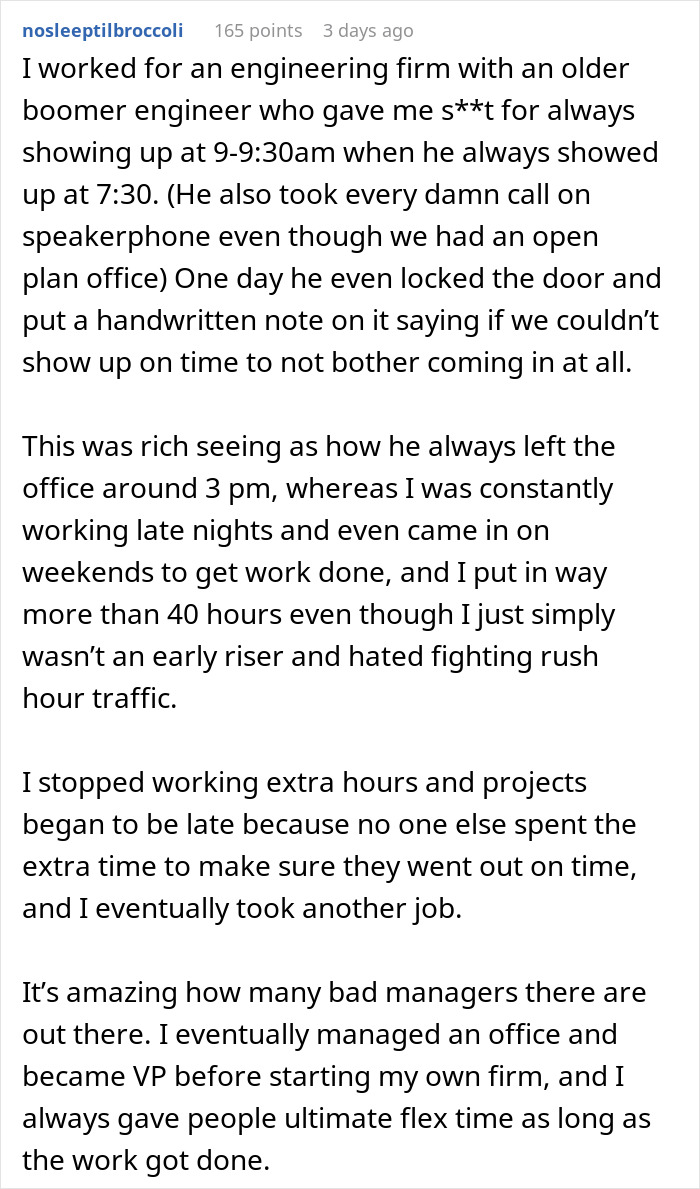
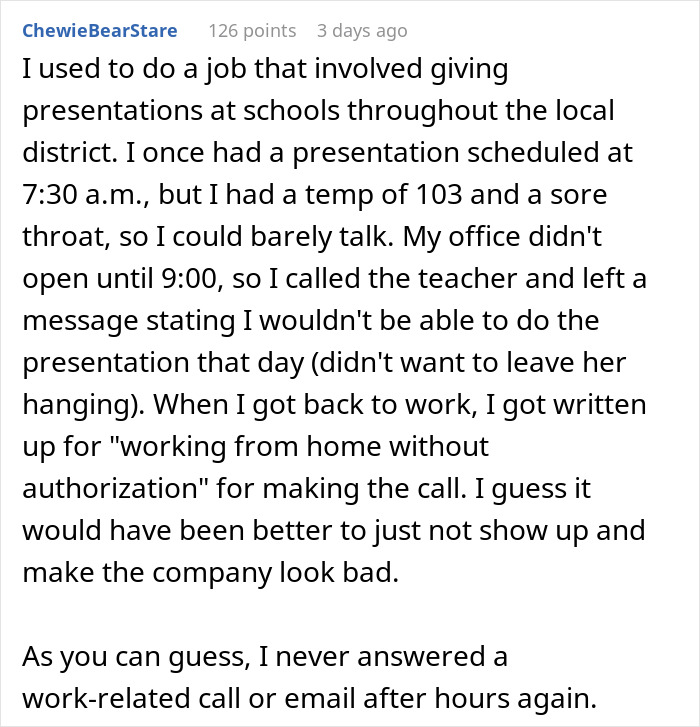


The post Person Maliciously Complies When They're Told They "Can't Work From Home" first appeared on Bored Panda.
from Bored Panda https://ift.tt/HUYhydN




No comments: